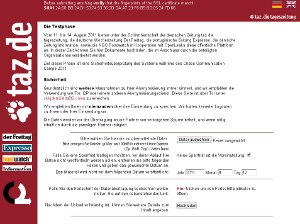Entries tagged as ssl
algorithm certificate cryptography eff observatory pss rsa security android ac100 cloudflare facebook gentoo hash https laptop linux notebook sha1 sha256 smartbook subnotebook tls toshiba ubuntu updates windowsxp antivirus bundestrojaner freak kaspersky mcaffee mitm onlinedurchsuchung virus vulnerability apache certificates datenschutz datensparsamkeit encryption grsecurity itsecurity javascript karlsruhe letsencrypt mod_rewrite nginx ocsp ocspstapling openssl php revocation serendipity sni symlink userdir vortrag web web20 webhosting webmontag websecurity berserk bleichenbacher chrome firefox nss poodle browser ajax clickjacking content-security-policy csp dell edellroot html khtml konqueror maninthemiddle microsoft rss superfish webcore xss ca cacert ccc certificateauthority md5 privatekey sha2 symantec transvalid x509 aiglx blog calendar come2linux compiz email english essen games ipv6 kubik ludwigsburg lug lugbk openstreetmap planet rc2 schokokeks simplesharingextensions smime stadtmitte webinale wine xgl cbc gnutls luckythirteen padding 23c3 24c3 4k assembler berlin bewußtsein braunschweig bsideshn c4 cctv copyright darmstadt drm dvb easterhegg entropia freesoftware gpn gpn5 gpn6 gpn7 hacker hannover jugendumweltbewegung jukss kongress königswusterhausen licenses mrmcd mrmcd100b mrmcd101b mysmartgrid ökologie papierlos passwörter pgp philosophie privacy programmieren programming publicdomain querfunk radio rsaoaep rsapss science server slides stuttgart surveillance talk theory tpm überwachung überwachungskameras unicode utf-8 wahl wahlcomputer wahlmaschinen wiesbaden wiki cccamp cccamp15 cccamp11 openleaks taz chromium crash diffiehellman forwardsecrecy keyexchange cve debian ghost glibc redhat cookie bigbluebutton drupal fileexfiltration gallery jodconverter libreoffice mantis session sniffing squirrelmail core coredump segfault webroot webserver crypto http apt badkeys cmi deb deolalikar diploma diplomarbeit enigma fedora fortigate fortinet gnupg gpg gsoc key keyserver leak libressl math milleniumproblems modulobias nist openbsd openid openidconnect openpgp packagemanagement password pnp provablesecurity random revoke rpm schlüssel sha512 signatures sso thesis university verschlüsselung wordpress abuse aok boranet botnet ddos etymologie lg ncable spam sprache aead aes cfb cms gajim jabber joomla otr owncloud update xmpp babelfish camera canon china chinese csrf gadgets gammu gnokii googletranslate gphoto josm journalist language mandarin media merkaartor mobile moodle nokia ptp russia russian s9y time translation travel universaltranslator writing ffmpeg flash flv ftp gstreamer mozilla mplayer multimedia video vlc xine xsa youtube zzuf 3d addresssanitizer asan beryl bufferoverflow c censorship clang compizfusion composite developer france freedomofspeech gcc gebabbel gps gpsbabel idn iputils kde lenovo memorysafety metacity mobiletrailexplorer nancy ping politics rmll thinkpad useafterfree x1carbon xorg zensur administration howto iptables network proxy rfc squid adguard breach cookies crime heist komodia netfiltersdk privdog protocolfilters samesite ip rootserver agenda21 barcamp bnn bodensee bundesverfassungsgericht co2 computerspiele demonstration ejc enbw energie freeculture fricard gamer garmin geo geocaching geodaten informationdisclosure jonglieren killerspiele klimaschutz kohlekraftwerk mysql openexpo opensourceexpo press presse rfid rhein steinkohle umweltschutz uni vorratsdatenspeicherung zkm 1und1 artikel ati augsburg augsburgerallgemeine backnang bahn bash bios bonn cardreader ccwn chemnitz cinelerra clt compression console cpu cpufreq creativecommons delilinux demoscene desktop developingworld distribution dmidecode driver eltorito esslingen exe fma86t frankreich freedesktop freifunk frequencies froscon froscon2007 gaia gatos gnome google googleearth graphics grub gtk harddisk hardware hddtemp heartbleed homebrew hp ibm ico icons icoutils inkscape installparty iso itu kgtk kubuntu lessig license lit07 lm_sensors lpi lpic lspci lsusb luga macos mandriva memdisk memorystick messe metisse motherboard movie nouveau nvidia olpc omnibook opengl overheatd overheating pciids pcmagazin pcmcia qt r300 radeon randr12 rar reverseengineering ricoh samsung sd sdricohcs shellshock siegburg smart smartmontools sncf softwarefreedomday standards support syslinux t61 thesource theunarchiver tv tvout unar usability usb usbids vc-1 videoediting vista waiblingen wii wiibrew win32codecs windows windowsrefund wlan wmv wos wos4 wrestool zeitung afl americanfuzzylop fuzzing code distributions infoleak pdo sizeof stacktrace blogdieb earth fdl feed hackergotchi harvester lawblog mars python recht rechtsanwalt udovetter factoring diplomathesis simple upgoerfive words 0days 27c3 adobe afra altushost antivir auskunftsanspruch axfr azure bias botnetz bsi bugbounty bundesdatenschutzgesetz busby bypass cellular chcounter clamav conflictofinterest dingens dns domain eplus firewall freewvs frequency fsfe gimp git gobi gsm hackerone hacking helma internetscan ircbot malware mephisto mobilephones mpaa napster nessus newspaper ntp ntpd openbsc openbts openvas osmocombb panda passwordalert passwort phishing rand salinecourier shellbot sicherheit snallygaster sqlinjection staatsanwaltschaft study subdomain sunras tlsdate toendacms unicef vulnerabilities webapps wiretapping zerodays zugangsdaten klima klimacamp strom stromsparen wachstum wirtschaftswachstum absturz atari blinkenlights brownbox cccs db demokratie environment fsf k21 lightwerk mappus painstation patents plebiszit police policeviolence politik pong pongmechanik pongmythos protest publictransport rech retrogames s21 schuster softwarepatents stallman stuttgart21 traffic umwelt verkehr volksabstimmung wien wkv informationsfreiheit unserwasser volksbegehren wasser bugtracker github nextcloud acid3 base64 css midori script webdesign webkit webstandards topberlin
 OpenLeaks is a planned platform like WikiLeaks, founded by ex-Wikileaks member Daniel Domscheit-Berg. It's been announced a while back and
OpenLeaks is a planned platform like WikiLeaks, founded by ex-Wikileaks member Daniel Domscheit-Berg. It's been announced a while back and 